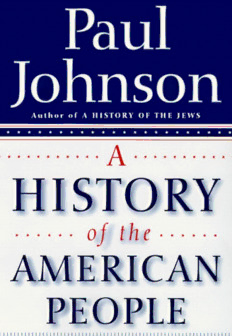
A History of the American People PDF
640 Pages·1998·3.701 MB·English
Most books are stored in the elastic cloud where traffic is expensive. For this reason, we have a limit on daily download.
Preview A History of the American People
Description:
"The creation of the United States of America is the greatest of all human adventures," begins Paul Johnson's remarkable new American history. "No other national story holds such tremendous lessons, for the American people themselves and for the rest of mankind." Johnson's history is a reinterpretation of American history from the first settlements to the Clinton administration. It covers every aspect of U.S. history -- politics; business and economics; art, literature and science; society and customs; complex traditions and religious beliefs. The story is told in terms of the men and women who shaped and led the nation and the ordinary people who collectively created its unique character. Wherever possible, letters, diaries and recorded conversations are used to ensure a sense of actuality. "The book has new and often trenchant things to say about every aspect and period of America's past," says Johnson, "and I do not seek, as some historians do, to conceal my opinions." Johnson's history presents John Winthrop, Roger Williams, Anne Hutchinson, Cotton Mather, Franklin, Tom Paine, Washington, Adams, Jefferson, Hamilton and Madison from a fresh perspective. It emphasizes the role of religion in American history and how early America was linked to England's history and culture and includes incisive portraits of Andrew Jackson, Chief Justice Marshall, Clay, Lincoln and Jefferson Davis. Johnson shows how Grover Cleveland and Teddy Roosevelt ushered in the age of big business and industry and how Woodrow Wilson revolutionized the government's role. He offers new views of Harding, Coolidge and Hoover and of Franklin Roosevelt's New Deal and his role as commander in chief during World War II. An examination of the unforeseen greatness of Harry Truman and reassessments of Eisenhower, Kennedy, Johnson, Nixon, Reagan and Bush follow. "Compulsively readable," said Foreign Affairs of Johnson's unique narrative skills and sharp profiles of people. This is an in-depth portrait of a great people, from their fragile origins through their struggles for independence and nationhood, their heroic efforts and sacrifices to deal with the "organic sin" of slavery and the preservation of the Union, to its explosive economic growth and emergence as a world power and its sole superpower. Johnson discusses such contemporary topics as the politics of racism, education, Vietnam, the power of the press, political correctness, the growth of litigation and the rising influence of women. He sees Americans as a problem-solving people and the story of America as "essentially one of difficulties being overcome by intelligence and skill, by faith and strength of purpose, by courage and persistence.... Looking back on its past, and forward to its future, the auguries are that it will not disappoint humanity.""This challenging narrative and interpretation of American history by the author of many distinguished historical works is sometimes controversial and always provocative. Johnson's views of individuals, events, themes and issues are original, critical and admiring, for he is, above all, a strong believer in the history and the destiny of the American people."Paul Johnson's A History of the American People is as majestic in its scope as the country it celebrates. His theme is the men and women, prominent and unknown, whose energy, vision, courage and confidence shaped a great nation. It is a compelling antidote to those who regard the future with pessimism." -- Henry A. Kissinger"He understands something most academics today do not know or want to admit -- that the social and political history of the United States has been driven largely by a peculiar religiosity that in time made Americanism itself into a civic religion.... Though America's civic religion is his major theme, Johnson by no means ignores material civilization. His explanations of America's rapid industrialization after the Civil War and Great Depression of the 1930s are lengthy, learned and [to me] persuasive, and his digressions in such matters as urban planning are evocative.... He also makes due reference to the history of women, immigrants, blacks and Indians, and does so without the breast-beating cant that has become de rigueur for U.S. historians.... His zesty, irreverent narratives teach more history to more people than all the postmodernist theorists, highbrow critics and dons put together." -- Walter A. McDougall, University of Pennsylvania, The Times Literary Supplement
See more
The list of books you might like
Most books are stored in the elastic cloud where traffic is expensive. For this reason, we have a limit on daily download.
